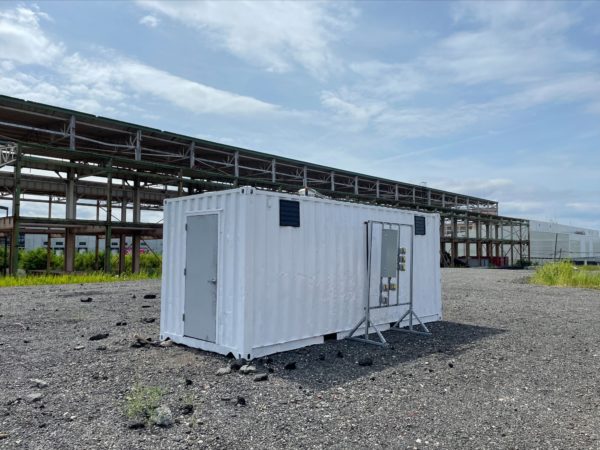As a teen taking environmental science classes, Kwaku Jyamfi assumed he’d spend his career working in water treatment. But after learning how many people lived without access to affordable and reliable electricity, Jyamfi decided he wanted to try to improve lives and combat climate change simultaneously.
In 2018, the Carnegie Mellon University alumnus cofounded Farm to Flame, a Duquesne-based startup bringing clean energy to farmers and businesses via manufacturing generators that replace diesel with carbon neutral feedstocks.
With Farm to Flame’s technology, materials that would typically be thrown away can become fuel: Yard waste, cornstalks, woody debris, sawdust and others can be burned to create smokeless and odorless energy.
Why does it matter? When power goes out during natural disasters or due to or living in remote locations, those in need of electricity typically rely on diesel generators, which can be costly, financially and environmentally. Diesel generators emit carbon monoxide and carbon dioxide, whereas Farm to Flame generators are smokeless, odorless and operate at half the cost, according to the company.

Kwaku Jyamfi. (Courtesy photo)
For Jyamfi, energy poverty is a cause that hits close to home.
“My family is from Ghana, where, in West Africa, there’s power problems,” Jyamfi said. “In Nigeria, there’s a really big power problem, where if they have [to use] diesel for when they don’t have electricity [during blackouts]. So they use diesel for over a third of the year. So it was something that I felt that I always wanted to help improve emerging nations.”
The first Farm to Flame generator was built on Jyamfi’s porch alongside his cofounder Will McKnight with a $100,000 grant from the Environmental Protection Agency in 2021. When their first generator proved functional, they poured their money into making one generator into 10 generators, and soon they began to attract funders such as the Richard King Mellon Foundation and the New Jersey Commission on Science, Innovation and Technology, as well as Kiva loans.
The EPA “really allowed us to bring it from a lab demonstration to actual commercial, viable product,” Jyamfi said. “So we’re very grateful to them for that.”
In the past year, Farm to Flame has had a successful pilot program with the City of Pittsburgh via its participation in the PGH Lab accelerator, is currently piloting with biomass electricity producer Georgia-Pacific, and has established a manufacturing hub in Allegheny County, with other pilot programs in the works. It also previously participated in the Ascender accelerator, and was recently named the Climate Impact & Regeneration Prize Runner-Up for the 2022 Cisco Global Problem Solver Challenge.
Still, with an estimated 700 million people in the world without consistent access to electricity, the company plans to go bigger.

Stefano Alva. (Courtesy photo)
The startup is hoping eco-friendly investors choose to donate to Farm to Flame’s WeFunder campaign which is seeking $600,000 in investments. If that target is reached, Farm to Flame’s leaders say they’ll be one step closer to bringing affordable renewable electricity to those who need it the most.
Stefano Alva, the company’s chief financial officer, explained that the company is going the WeFunder route as opposed to courting more traditional investors because crowdfunding is more in the community-focused spirit they’d like to build Farm to Flame on.
“Before crowdfunding, it was institutional investors — kind of like that 1% — that got the ability to invest in the startup that had the potential to explode. And now with crowdfunding, it allows the community and people who are not accredited investors to play a part in supporting a company from its early stages,” Alva said. “And so I see that a lot of people in the community are just excited about being able to be investors in the company.”
Farm to Flame’s WeFunder is accepting new investors through October.
Atiya Irvin-Mitchell is a 2022-2024 corps member for Report for America, an initiative of The Groundtruth Project that pairs young journalists with local newsrooms. This position is supported by the Heinz Endowments.Join the conversation!
Find news, events, jobs and people who share your interests on Technical.ly's open community Slack





